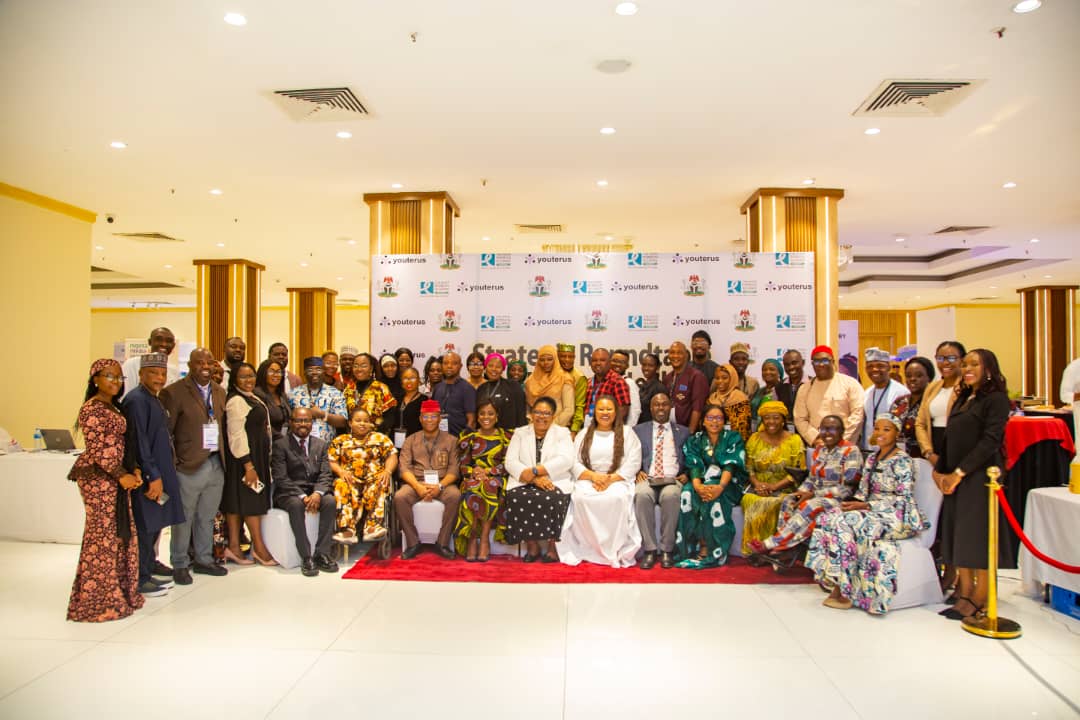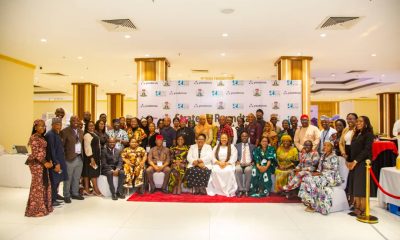NEWS
FG Worries over 75 Per Cent Desertification Threat in Northern States

By David Torough, Abuja
Vice-President Kashim Shettima said Nigeria will soon phase out diesel dependency and cut carbon emissions through the nation’s integrated hybrid energy system.Shettima stated this yesterday while declaring open the Decarbonising Infrastructure in Nigeria Summit (DIN SUMMIT), in Abuja.
He warned that Nigeria would struggle to compete or catch up with the world, if the nation’s climate dreams do not align with its development realities. “Onne Port, for instance, is already emerging as the template for our quest to breathe life into a robust green economy.”Discussions are currently underway with private investors to commit nearly 60 million dollar to electrify the port and transform it into Nigeria’s first green port.“This is a strategic leap. Through an integrated hybrid energy system, we will phase out diesel dependency, slash carbon emissions, and provide 24/7 sustainable and affordable power to terminal operators and port users,” he said.Shettima explained that 75 percent of Nigeria’s greenhouse gas emissions come from the infrastructure sector, including energy, transport, urban development, and agriculture.These sectors, according to him, are not just carbon-heavy but also form the nation’s economic arteries, especially agriculture, which supports 70 per cent of rural livelihoods.Shettima observed that, while the staggering figures are a wake-up call for a nation that figures them out, the only way of the “predicted doom is to decarbonise these systems.”The Vice-President added that the target is to build a Nigeria with infrastructure that heals, and not one that harms.”This is how we can alter our trajectory. If we do this right, we stand to generate over 1.5 million green jobs by 2035.”We can also cultivate new export markets in clean energy and climate-smart agriculture, which would transform Nigeria into a regional leader in low-carbon enterprise.“Distinguished ladies and gentlemen, we are not here to fantasise, we are here to finance, mobilise, de-risk and build.”The Nigeria we want cannot be realised on diesel generators and fragile grids, it will not emerge from a model that chokes our lungs while draining our treasury.”We must build a Nigeria whose infrastructure heals rather than harms,” he saidHe described the theme of the summit, “Unlocking Climate Finance for Sustainable Development,” as very apt.He said the nation faces an urgent and immense task of decoupling its development from the carbon-intensive models of the past and to do so without leaving any Nigerian behind.” This is why we must strengthen our regulatory frameworks, harmonise policy across sectors and tiers, launch tools like the Green Investment Portal to connect capital to climate-smart opportunities.“This is why we must have our states at the forefront of this march to the future to show that decarbonisation must not stop at Abuja’s gates.”It must reach every local government, every community, every home,” he stressed.The Director-General, National Council on Climate Change (NCCC), Dr Nkiruka Maduekwe, said Nigeria must urgently transition to a low-carbon economy.This, she said despite contributing minimally to global emissions because of its vulnerability to climate change impacts.“Although Nigeria’s contribution to global carbon emission is very minimal, Nigeria is highly vulnerable to the impacts of climate change.“This is because of its location in the African continent as well as our low adaptive capacity,” Dr Maduekwe said.She also called for substantial private sector investment in sustainable infrastructure development, particularly in energy systems and transportation transformation.The Personal Assistant to the President on Sub-national Infrastructure (Office of the Vice-President), Musaddiq Adamu, emphasised the administration’s commitment to sub-national leadership in driving climate innovation.FG Worries over 75% Desertification Threat in Northern StatesThe Federal Government has expressed deep concern about the escalating threat of desertification across parts of northern Nigeria, disclosing that between 50 and 75 percent of the landmass in Bauchi, Borno, Gombe, Jigawa, Kano, Katsina, Kebbi, Sokoto, Yobe, and Zamfara States is already affected.The Minister of Environment, Engr. Balarabe Lawal, made this known in Abuja during a workshop aimed at reviewing the National Policy on Drought and Desertification. The event was supported by the World Bank through the ACReSAL Project.Describing desertification as the most pressing environmental challenge facing Nigeria’s dryland regions, Lawal warned that the affected states—covering about 38 percent of the country’s total land area and home to nearly 27 million people—are increasingly at risk of poverty, food insecurity, and forced migration due to the harsh and worsening environmental conditions.The Minister who was represented by the Permanent Secretary, Mahmud Kambari noted that “the dryland region supports over 90 percent of Nigeria’s cattle, two-thirds of the sheep and goats, and almost all the donkeys, camels and horses. It also plays a vital role in agricultural production and the export of crops. But these areas have now been impoverished by drought and desert-like conditions.”According to the Minister, the land degradation across Nigeria is accelerating at an alarming rate. Data from 2000 to 2010 revealed the country lost over 463,000 hectares of forestland, with a significant portion converted to cropland, shrubs and grasslands.Over 360,000 hectares have experienced declining productivity, with many more showing early signs of deterioration.Lawal highlighted unsustainable land-use practices, agricultural expansion, deforestation, mining, urbanization, and climate change as key drivers of desertification and drought in Nigeria.He emphasised the need for a holistic and inclusive approach, incorporating input from affected communities and stakeholders across sectors.The Minister further lamented the limited effectiveness of the existing National Policy on Drought and Desertification, which was formulated in 2007.He said the 17-year-old document requires urgent review to address emerging gaps and integrate sustainable development principles such as gender equity, precautionary measures, and intergenerational justice.He urged participants to critically examine the current policy and contribute to the creation of a new framework that will be robust, participatory and capable of mitigating land degradation across the country.While commending the World Bank and ACReSAL for their support, the Minister called for stronger inter-sectoral collaboration to ensure the new policy aligns with national strategies on agriculture, mining, urban development and climate change.The National Project Coordinator of Agro-Climatic Resilience in Semi-Arid Landscapes (ACReSAL) project in Nigeria is Abdulhamid Umar revealed that the project is being co-implemented by the Federal Ministry of Water Resources, Agriculture and Environment with 19 northern states participating in the project.He pointed out that drought has become a recurring issue in the country, emphasizing the need to review the National Desertification and Drought Policy, which dates back to 2007, to align it with the current realities of climate change.He urged stakeholders to develop a comprehensive policy document that will lead to integrated landscape management and enhance the climate viability of the environment in the future.NEWS
Stakeholders task FG on making Uterine Health a priority

By Laide Akinbpade, Abuja
Stakeholders in the Health sector on Thursday, tasked the Federal Government (FG), to make women uterine health a priority in Nigeria.
This appeal was made at a one-day strategic roundtable on Uterine Health in Nigeria, organized by Federal Ministry of Health and Social Welfare (FMoH&SW) with The White Ribbon Alliance Nigeria and Youterus, in Abuja.
Uterine health is the overall condition and functionality of the uterus encompassing, it’s structural integrity and ability to perform its various roles such as menstruation and carrying a pregnancy.
Uterine health conditions like fibroid, abnormal uterine bleeding, endometriosis, chronic pelvic pain, endometrisis and menopause impact on millions of Nigerian women but are often excluded from national health policies and services.
It has been discovered that fibroid alone accounts for 30% of gynecological consultations at Nigerian tertiary hospitals.
With Uterine health missing from from the key national framework, it is therefore imperative for government to give it a priority.
Dr. Binyerem Ukaire said, women are the bedrock of every nation and are crucial to social economic development of any nation. A woman reproductive health cannot be good without good uterine health.
Dr. Samuel Oyeniyi, Director Reproductive Health, Division FMoH &SW, in his paper presentation titled, ‘Uterine Health and its public health importance in Nigeria’, at the occasion said Uterine Fibroids are extremely common affecting approxemately 12.1% of Nigerian women about 12.8million women nationwide
“Among black women the lifetime risk rises to 80% by age 50. Fibroids are major cause of hospital visits and gynecological surgeries leading to symptoms such as chronic pain, heavy menstrual bleeding, anemia and infertility, most women affected are in their productive age.
“Endometrisis affects upto 48.1% symptomatic Nigerian women in some studies, causing severe pelvic pain, painful menstruations and infertility and diagnosis takes between 7 to 10 years.
“PCO affects 17 -28% of Nigerian women disrupting mentrual cycles and causing hormonal imbalance that can lead to diabetes, obesity and cardiovascular risk and can be undertreated or underdiagnosied.
“While Pelvic Inflammatpry Disease (PID), affects 116 per 100,000 women in West Africa, making it a leading cause of infertility and ecotopic pregnancy in Nigeria.
“Cervical cancer causes more than 8,000 deaths and more than 13,000 new cases yearly in Nigeria . it is prevented by HPV vaccines and about 12 million Nigerian girls have been reached “.
But he said Nigeria’s Non-communicable Disease (NCD), action plan provide an opportunity to include chronic uterine conditions.
He concluded in his presentation by saying, investing $1 in uterine health would yield $9 in benefits.
Dr. Nana Chidi Emmanuel Chairperson, Board of Trustees White Ribbon Alliance Nigeria, in her welcome speech at the roundtable said it is imperative that women health especially uterine health should be prioritized in Nigeria’s health system.
She said currently women are going through a lot psychologically, mentally and other wise, so women health must be a priority to any government all over the world.
She said, “Chronic uterine conditions such as fibroids, abnormal uterine bleeding, and endometrosis affect millions of Nigerian women and girls, causing immeasurable suffering, recurrent medical crises, and economic hardship. Despite this immense burden, women facing these conditions have long confronted silence, stigma, and systemic neglect. Too often, their pain is dismissed, their diagnosis delayed, and their pathways to care—financially and logistically—out of reach.
“Today, together with our committed partners at Youterus Health, we affirm our collective will to change this narrative. We aim to place uterine health at the center of national policies in Nigeria and Africa, financing, and service delivery—moving it from the margins of awareness into the mainstream of Nigeria’s health and development agenda.
“Let us remember that at the heart of these deliberations are the stories and hopes of real women and girls—mothers, daughters, sisters, friends—who endure the daily realities of untreated uterine conditions. Their experiences fuel our urgency and remind us all why this work matters deeply. Our collective efforts here today can catalyze meaningful change that restores health, dignity, and hope.
“WRA Nigeria firmly believes that the leadership of the government working hand in hand civil society and the private sector, is essential to drive durable, just, and people-centered changes. It will take our united voices, innovative models, and steady commitment to dismantle the barriers that have persisted for too long”.
Fatou Wurie, the Chief Executive Officer and Founder of Youterus Health,
in her welcome speech said, uterine health affects millions of Nigerian women and it is under developed women wellbeing and it impact, not only the physical health but social and economy of any nation.
And this uterine health challenges have caused immeasurable suffering in women in Nigeria.
She lamented that most often the pain women feel is ignored and diagnosis delayed.
She said it is imperative for Federal Government to place uterine as a national priority that should be taken up.
“Uterine Health has long being an issue in the world. Uterine Health should be a national issue that should be on a top burner. We are really looking forward to government priotising uterine health in Nigeria”, she said.
Austin Akpakwu, from the office of the Vice President, who represented the Senior Special Assistant to Vice President on Public health, said the office of the Vice President, is keen to support in addressing the uterine health challenges in Nigeria, “It is a laudable project and the office of Vice President is very keen in supporting this project. I have a junior sister that has uterine health issue and that is presently in the hospital so this is very important issue and all hands must be on desk to address it”.

NAFDAC Generates N2.5bn from Illicit Drug Market Raids
By Ubong Ukpong, Abuja
The National Agency for Food and Drug Administration and Control (NAFDAC) on Wednesday, said that it generated N2.5 billion from its recent raids of illicit drug markets in Lagos, Onitsha, and Aba, respectively.
Director-General of the agency, Prof.
Mojisola Adeyeye, who revealed this during a session with the House of Representatives Committee on Food and Drug Administration and Control, said the funds were fines collected from traders found guilty of selling fake or substandard drugs during recent enforcement actions in open markets across the country.While stressing that all funds were paid directly into NAFDAC’s official account, she noted that N996 million was spent on enforcement operations, N159 million was borrowed from a donor grant, and N1.175 billion went to regulatory expenses.
According to her, the agency was left with about N206 million after deductions.
She said the operation, which deployed over 1,300 security personnel, uncovered widespread violations ranging from expired and unapproved drugs to poor storage practices.
Adeyeye said the enforcement drive, which lasted up to four weeks in some locations, uncovered serious threats to public health.
She disclosed that some shop owners were caught distributing banned substances like Tramadol and selling expired or unregistered medicines.
“These charges were not punitive but necessary. The standard fine for violating Good Distribution and Storage Practice (GDSP) is N2 million, but in many cases, we reduced it to N500,000,” she said.
She, however lamented that the agency’s inability to sustain such critical operations is being crippled by severe revenue restrictions imposed by the federal government
While decrying the financial constraints facing the agency, Adeyeye explained that at the end of 2023, NAFDAC had N19 billion in its accounts
The DG however noted that N9 billion was removed before the agency could access it, and only N4.5 billion was eventually released.
Speaking of the agency’s 2024 raid in Kano, she described the operation in the Northwestern state as a monumental and court-mandated intervention that differed significantly from the raids conducted in Lagos, Onitsha, and Aba.
She said the Kano raid was anchored on a judgment delivered on February 16, 2024, by the Federal High Court which ordered the relocation of open drug market traders to the newly constructed Coordinated Wholesale Centre (CWC), known as the Kanawa Pharmaceutical Centre.
Adeyeye clarified that no administrative charges or fines were collected during the Kano enforcement, due to the urgent and court-directed nature of the operation.
The DG however noted that post-marketing surveillance was carried out after relocation.
She added: “These are the lives we are trying to save. We had no funds at the time our accounts had just been shut down and reopened with zero balance at the start of January 2024. Yet, we had to carry out the court judgment and move over 1,300 shops into the regulated centre.”
Adeyeye stated that Kano was the only state that had built its CWC as mandated by a presidential directive, long before her tenure began.
Responding to lawmakers’ concerns that Kano traders were treated more leniently compared to the operations in the southern part of the country, she said the agency followed due process, guided by the urgency of the court judgment and prevailing security risks.
Clarifying the financial situation of the agency, Director of Finance and Accounts, NAFDAC, Adeniji Nma, said the Office of the Accountant-General of the Federation (OAGF) had unilaterally classified NAFDAC as a revenue-generating agency and begun sweeping up to 50 per cent of all revenue inflows into the federal treasury.
Because of it, we find it difficult to do most of our operations.”
After the presentation, a member of the committee, Hon. Emeka Idu, requested a detailed breakdown of the revenue generated from each location where fines were collected during the enforcement operations.
The NAFDAC team was unable to provide the breakdown at the hearing.
Chairman of the committee, Regina Akume, noted that the agency’s presentation was incomplete.
The committee, consequently, directed the agency to return with a comprehensive, location-by-location account of the N2.5 billion generated from the raids.
| ReplyReply allForwardAdd reaction |
NEWS
Adamawa Police Boost Capacity to Handle Gender-Based Violence Cases

From Yagana Ali, Yola
The Adamawa State Police Command, in collaboration with the United Nations Population Fund (UNFPA), has begun a second-phase step-down training on Gender-Based Violence (GBV) for its gender desk officers.
The training, held at the command’s conference hall in Yola, brought together 80 personnel, divided into batches A and B.
The Commissioner of Police, Morris Dankwabo, represented by Deputy Commissioner of Police John Sandere, urged the personnel to utilize the training to change the narrative of public perception on police handling of GBV cases.
Sandere emphasized the importance of updating their knowledge on GBV to effectively address the scourge in the state.
Resource person Balkisu Ahmed called on the general public and the police to work together to bring an end to GBV cases in the state.
Ahmed noted that every individual, organization and government is working hard to ensure perpetrators are brought to book and survivors receive justice.
The Police Public Relations Officer, Sulaiman Yahaya Ngroje, assured that the command is committed to ensuring that personnel knowledge is up-to-date on handling GBV cases and that justice is done to survivors.
Inspector Ijidugal Mperiju, Gender Desk Officer, Girei Division, commended the Adamawa Police Command for stepping down the training, saying it will enrich their knowledge on handling GBV cases and enable them to work diligently.
The training is a significant step towards enhancing the capacity of Adamawa State Police personnel to handle GBV cases effectively. The collaboration with UNFPA demonstrates the command’s commitment to protecting the rights of citizens, particularly vulnerable groups.
















